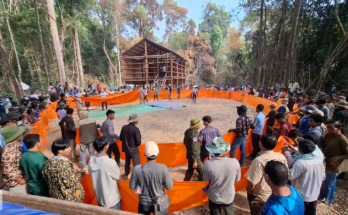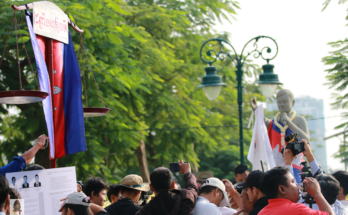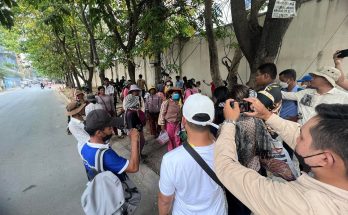Press Statement
07 March 2013, Phnom Penh – On International Women’s Day, the Cambodian Human Rights and Development Association (ADHOC) urges to the Royal Government of Cambodia to ensure the implementation of relevant legislation in place to protect the rights of women and children, in order to tackle impunity, and particularly: to pay more attention to ways in which abuses against women and children can be prevented.
On February 28 2013, the Cambodian Human Rights and Development Association released a report entitled: “The Issues of Women’s and Children’s Rights and Migrant Workers in Cambodia.” The report detailed some positive developments in the protection of women’s and children’s rights, and an increasing impetus on the part of the authorities to address abuses in some cases. There have been positive legislative developments, such as the Law on Prevention of Domestic Violence and Victim Protection; the Law on Suppression of Human Trafficking and Sex Exploitation and some aspects of the Penal Code. Further, the government ratified recently the Optional Protocol of Convention of Elimination of all forms of Discrimination against Women (CEDAW).
However, despite some progress, ADHOC continued to observe rights abuses with an average of two cases of Gender Based Violence (GBV) reported to ADHOC each day. This shows that law enforcement is lacking and these abuses continue. Despite some cases in which women have successfully brought perpetrators to justice, many women and children still suffer discrimination, rights abuses, cruelty, and violence- including murder.
ADHOC is concerned at the frequency and severity of rights abuses against women and children occurring in 2012. It is remarkable that in six cases of violence in the family that resulted in murder, three of the perpetrators have yet to face justice.
Violence within the family affects family members over generations and causes harm in a number of ways, sending bad signals to the children. It also contributes to people becoming migrant workers or becoming the victims of human trafficking in order to escape abuses.
During the first two months of this year, there were at least 124 cases reported to ADHOC relating to violence in the family; sexual harassment, unregulated migrant labor and human trafficking. ADHOC’s figures show 52 cases of violence in the family, 68 cases of sexual harassment; 40 cases of human trafficking and abuse of migrant worker’s rights, affecting 282 persons. Furthermore, sexual abuse, gang rape and rape-killing still occur: three gang-rape cases and three rape-killing cases were sent to ADHOC – among this number, in two cases the perpetrators are still free.
The above demonstrates the weakness enforcement of laws in practice and the pervasive impunity in Cambodia. This has particularly been the case with regard to the Law on the Prevention Domestic Violence and Protection of Victims.
In addition to GBV, women and children were affected by forced eviction and land grabs. At least 30,009 families were affected by forced evictions in 2011 and land grabbing. The evictions of the Borei Keila community and the Boeung Kak Lake community caused numerous rights violations.
In order to promote and protection Human Rights and Women’s Rights recommends:
- The government, and especially local authorities, urgently intervene in domestic violence cases as they happen, and not to allow mediations between couples to substitute the judicial process;
- Government should create mechanisms and specific procedures to protect and save victims from perpetrators to ensure their safety, and should offer advice to victims
- The government should take action against local authorities or government officers who fail to properly implement their obligations, or do so contrary to the provisions of the law;
- The authorities must improve effective law enforcement and punish perpetrators to eliminate the culture of impunity;
- Improve public awareness of various laws regarding domestic violence, rape, sexual harassment, and discrimination.
- Suggest to the Cambodian government to cease forced evictions or at the very least provide affected communities with fair compensation with respect to the basic needs and rights of affected communities.
គឺបញ្ហានិទណ្ឌភាពលើឃាតកម្មទាំងនោះ ដូចជាករណីថ្មីៗនេះ ចំនួន៣ករណី(ករណីស្រោចទឹកអាស៊ីត និង ឃាតកម្មនៅក្នុងគ្រួសារ) នៃករណី៦ករណីដែលកើតឡើងថ្មីៗនេះ (ហិង្សាសម្លាប់) ដែលជនប្រព្រឹត្តមិនត្រូវបានផ្តន្ទាទោសនៅឡើយ ។ ទង្វើសាហាវព្រៃផ្សៃ អមនុស្សធម៌ ដូចជាការកាប់សម្លាប់ វាយដំធ្ងន់ធ្ងរ ការប្រើទឹកអាស៊ីត ក្នុងរង្វង់គ្រួសារ (រវាងអ្នកដែលមានមនោសញ្ចេតនាជ្រាលជ្រៅនឹងគ្នា) ដែលបានបណ្តាលឲ្យប៉ះពាល់យ៉ាងធ្ងន់ធ្ងរ ដល់សមាជិកគ្រួសារផ្ទាល់ក៏ដូចជាសង្គមទាំងមូល ដូចជា បណ្តាលឲ្យគ្រួសារខ្វះភាពសុខដុមរមនា ជះឥទ្ធិពលមិនល្អដល់ការសិក្សារបស់កូនៗ ជាគំរូអាក្រក់ដល់យុវជនជំនាន់ក្រោយ និងបណ្តាលឲ្យភាគីរងគ្រោះ ស្ថិតនៅក្នុងភាពភ័យខ្លាច មានជម្ងឺផ្លូវចិត្ត ជម្ងឺថប់អារម្មណ៍ ជំរុញឲ្យមានការធ្វើចំណាកស្រុកប្រថុយប្រថាន ក្លាយជាកម្មវត្ថុនៃការជួញដូរ ឈានទៅប្រព្រឹត្តអំពើល្មើសច្បាប់ ។ ទន្ទឹមនឹងបញ្ហាដែលជាក្តីបារម្ភចំបងក្នុងរយៈពេលថ្មីៗនេះ គឺឃាតកម្មនៅក្នុងគ្រួសារ ករណីរំលោភសេពសន្ថវៈបូក និង រំលោភសម្លាប់ នៅតែកើតមានឡើង ដូចជាករណីជាក់ស្តែងនៅករណីរំលោភបូកនៅខេត្តកណ្តាល និង ករណីរំលោភសម្លាប់លើជនបរទេស នៅខេត្តកំពតជាដើមនៅតែបន្តកើតមាន។ ក្នុងរយៈពេល២ខែដើមឆ្នាំនេះ យ៉ាងហោចណាស់មានចំនួន១២៤ករណី ដែលពាក់ព័ន្ធនឹងបញ្ហាហិង្សាក្នុងគ្រួសារ រំលោភសេពសន្ថវៈ ជួញដូរមនុស្ស និងការរំលោភសិទ្ធិពលករ ចំណាកស្រុក (ហិង្សាក្នុងគ្រួសារ៥២ករណី រំលោភសេពសន្ថវៈ ៦៨ករណី ករណីជួញដូរមនុស្ស និង ករណីរំលោភសិទ្ធិពលករ ចំណាកស្រុក ចំនួន៤០ករណី) ដែលបានប៉ះពាល់ដល់ស្ត្រី និងកុមាររងគ្រោះប្រមាណ២៨២នាក់ (៨៦.៥០%នៃចំនួនទាំងអស់៣២៦នាក់) ។
ស្ថានភាពសាហាវយង់ឃ្នងបែបនេះបង្ហាញនូវភាពទន់ខ្សោយនៃការអនុវត្ដន៍ច្បាប់ និងបញ្ហា និណ្ឌភាព នៅតែប្រឈម ចំពោះការដំណើរការកសាងនីតិរដ្ឋនៅកម្ពុជា ជាពិសេសច្បាប់ស្តីពីការទប់ស្កាត់អំពើហិង្សា និងច្បាប់ស្តីពីការគ្រប់គ្រង់អាស៊ីត ។
ក្រៅពីការរងគ្រោះដោយសារការរើសអើងការរំលោភបំពានដោយសារ ភេទ ស្ត្រី និងកុមារ ក៍ទទួលរងនូវការបណ្តេញចេញ ការបាត់បង់ដីធ្លី ផងដែរ។ យ៉ាងហោចណាស់មានប្រជាពលរដ្ឋ ៣០,០០៩ គ្រួសារ[1]រងនូវការបណ្តេញចេញពីលំនៅដ្ឋាន ករណីជាក់ស្តែងដូចជាការបណ្តេញសហគមន៍នៅបូរីកីឡា បឹងកក់ ជាដើម ដែលបានបណ្តាលឲ្យប៉ះពាល់ដល់សិទ្ធិជាមូលដ្ឋានរបស់មនុស្ស ក៍ដូចសិទ្ធិស្ត្រី និងកុមាររស់នៅក្នុងសហគមន៍ទាំងនោះ។
ដើម្បីលើកកម្ពស់ និងធានានូវការពារសិទ្ធិមនុស្ស សិទ្ធិស្ត្រី សមាគមអាដហុកសូមអំពាវនាវដល់រាជរដ្ឋាភិបាល និងស្ថាប័នពាក់ព័ន្ធដូចខាងក្រោម៖
- រាជរដ្ឋាភិបាលជាពិសេសអាជ្ញាធរមានសមត្ថកិច្ចគួរតែអន្តរាគមន៍ជាបន្ទាន់ចំពោះករណីអំពើហិង្សាក្នុងគ្រួសារ មិនត្រូវជម្រុញឲ្យភាគីធ្វើការសម្រុះសម្រួលករណីហិង្សាដែលកើតឡើងជាលើកទី២ ឬ របួសធ្ងន់ធ្ងរឡើយ
- រដ្ឋាភិបាលគួរបង្កើតឲ្យមានយន្តការនិងនីតិវិធីជាក់លាក់ក្នុងការជួយសង្រ្គោះជនរងគ្រោះឬជនមុខសញ្ញាដើម្បីធានាសុវត្តិភាពចំពោះជនរងគ្រោះនិងគួរបង្កើតកន្លែងអប់រំកែប្រែ ដល់ជនប្រព្រឹត្តអំពើហិង្សាក្នុងគ្រួសារ ក្នុងដំណាក់កាលឃាត់ខ្លួន
- ត្រូវមានវិធានការតឹងតែងចំពោះចំពោះមន្ត្រីឬអាជ្ញាធរណាដែលមិនបានបំពេញកាតព្វកិច្ចរបស់ខ្លួនត្រឹមត្រូវដូចមានចែងក្នុងច្បាប់ស្តីពីការទប់ស្កាត់អំពើហិង្សាក្នុងគ្រួសារនិងកិច្ចការពារជនរងគ្រោះ និង ការមិនអនុវត្តន៍ខុសទៅនឹង នីតិវីធីច្បាប់ ដូចជាការសម្រុះសម្រួលករណីរំលោភសេពសន្ថវៈ និងហិង្សាធ្ងន់ធ្ងរ ដូចមានចែងមាត្រា៣៦ នៃច្បាប់ពីការទប់ស្កាត់អំពើហិង្សាក្នុងគ្រួសារ និងកិច្ចការពារជនរងគ្រោះ
- ពង្រឹងប្រសិទ្ធភាពអនុវត្តច្បាប់បន្ថែមទៀតក្នុងការផ្តន្ទាទោសជនប្រព្រឹត្តិល្មើសដើម្បីលប់បំបាត់នូវវប្បធម៌រួចទោស
- គួរបង្កើនការបោះពុម្ពផ្សាយជាសាធារណៈអំពីផលវិបាកនៃអំពើហិង្សាក្នុងគ្រួសារ និងអំពើរំលោភសេពសន្ថវៈ អំពើរំលោភបំពានផ្លូវភេទ ជាពិសេសវិធីសាស្ត្រទប់ស្កាត់ បង្កា ការពារឲ្យបានម៉ត់ចត់ នូវរាល់ទម្រង់នៃការរើសអើងប្រឆាំងនឹងស្ត្រី និងកុមារ
- ស្នើរាជរដ្ឋាភិបាលបញ្ឈប់ការបណ្តេញចេញដោយបង្ខំ ក្នុងករណីចៀសវាងមិនបាន គួរមានការផ្តល់សំណងសមស្របជាមុន ជូនពលរដ្ឋដែលនឹងប៉ះពាល់ ព្រមទាំងធានាបាននូវសិទ្ធិជាមូលដ្ឋានរបស់មនុស្ស ជាពិសេស សិទ្ធិស្ត្រី និង កុមារ
ភ្នំពេញ ថ្ងៃទី ៧ កុម្ភៈ ឆ្នាំ ២០១៣
ពត៌មានបន្ថែមសូមទំនាក់ទំនង៖
‑អ្នកស្រី ជួន ចំរុង ប្រធានកម្មវិធីស្ត្រី និងកុមារ នៃសមាគមអាដហុក ០១២ ៨៣២ ០៦៩
‑អ្នកស្រី លឹម មុនី អនុប្រធានកម្មវិធីស្ត្រី និងកុមារ នៃសមាគមអាដហុក ០១២៨៣៤៤៤៩
[1]ទំព័រ១៨ នៃរបាយការណ៍ស្ថានភាពដីធ្លី លំនៅដ្ឋាន និងធនធានធម្មជាតិ “ A turning Point ?” ខែកុម្ភៈ ២០១៣



